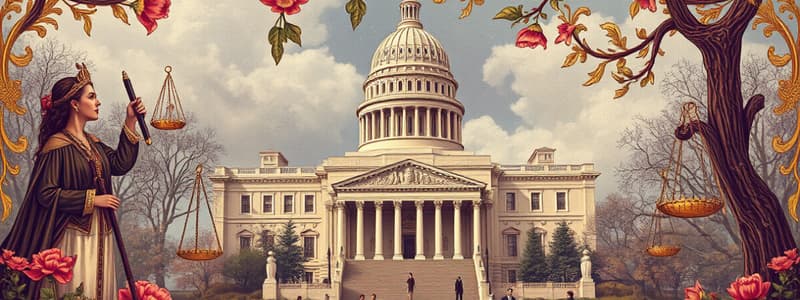Podcast
Questions and Answers
What is the primary responsibility of the Legislative Branch in the context of the criminal justice system?
What is the primary responsibility of the Legislative Branch in the context of the criminal justice system?
- Creating laws that define crimes and penalties. (correct)
- Interpreting laws through the court systems.
- Enforcing laws through police agencies.
- Ensuring fair trials for defendants.
Which amendment protects individuals from unlawful searches and seizures?
Which amendment protects individuals from unlawful searches and seizures?
- Sixth Amendment
- Fourth Amendment (correct)
- Eighth Amendment
- Fifth Amendment
Which criminal justice objective focuses on reforming offenders to prevent future crimes?
Which criminal justice objective focuses on reforming offenders to prevent future crimes?
- Retribution
- Deterrence
- Restoration
- Rehabilitation (correct)
What does discretion in the criminal justice system refer to?
What does discretion in the criminal justice system refer to?
Which of the following best describes the nonsystem argument in criminal justice?
Which of the following best describes the nonsystem argument in criminal justice?
What is the main objective of deterrence within the criminal justice system?
What is the main objective of deterrence within the criminal justice system?
Which of the following is NOT a right guaranteed by the Constitution in the context of criminal justice?
Which of the following is NOT a right guaranteed by the Constitution in the context of criminal justice?
In what way can discretion negatively affect the criminal justice system?
In what way can discretion negatively affect the criminal justice system?
Restoration in the context of criminal justice primarily aims to achieve what?
Restoration in the context of criminal justice primarily aims to achieve what?
Which branch of government is responsible for interpreting laws and ensuring fair trials?
Which branch of government is responsible for interpreting laws and ensuring fair trials?
Flashcards are hidden until you start studying
Study Notes
Branches of Government
- Legislative Branch:
- Responsible for crafting laws that define criminal acts and associated penalties.
- Develops criminal codes and statutory regulations to guide law enforcement and judicial actions.
- Executive Branch:
- Enforces the laws through various law enforcement agencies like the police.
- Oversees the administration of justice including operation of correctional institutions and rehabilitation programs.
- Judicial Branch:
- Interprets and applies the law through a structured court system.
- Guarantees fair trials and adjudicates criminal cases to uphold justice.
Role of the Constitution
- Establishes a foundational framework for the criminal justice system, ensuring legality and fairness.
- Protects individual rights, including due process and the right to legal counsel.
- Fourth Amendment safeguards against unlawful searches and seizures.
- Sixth Amendment ensures rights to a fair trial, while the Eighth Amendment prohibits cruel and unusual punishments.
Criminal Justice Objectives
- Deterrence: Aims to prevent crime by instilling fear of legal consequences.
- Retribution: Focuses on delivering justice by imposing appropriate penalties on offenders.
- Rehabilitation: Seeks to reform offenders, reducing the likelihood of reoffending and facilitating reintegration into society.
- Incapacitation: Involves removing offenders from the community to ensure public safety.
- Restoration: Goals include repairing the harm done by crime and actively involving victims in the justice process.
Rules and Discretion
- Rules: Constructed guidelines and laws govern the conduct of law enforcement and judicial procedures.
- Discretion: Provides law enforcement, prosecutors, and judges the ability to make decisions based on the unique aspects of each case.
- Discretion can lead to disparities in law enforcement and judicial outcomes, impacting the consistency of the justice system.
- Essential for managing limited resources and addressing the complexities of individual cases.
Nonsystem Argument
- Posits that the criminal justice system operates as a disjointed entity, lacking cohesiveness.
- Emphasizes fragmentation among components such as law enforcement, courts, and corrections.
- Notes differing goals and inadequate coordination result in inefficiencies and hinder effective justice delivery.
- Claims that the various branches often pursue individual interests rather than a coordinated, unified objective.
Studying That Suits You
Use AI to generate personalized quizzes and flashcards to suit your learning preferences.




